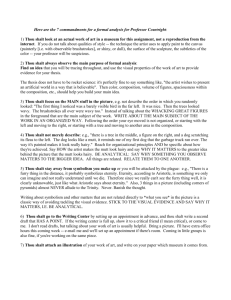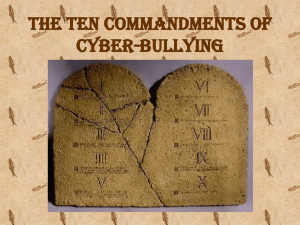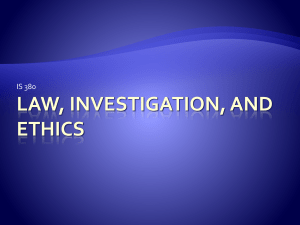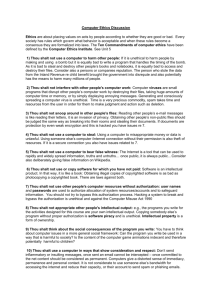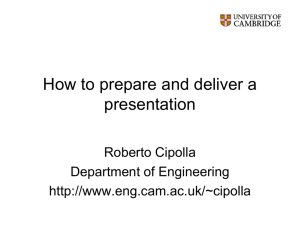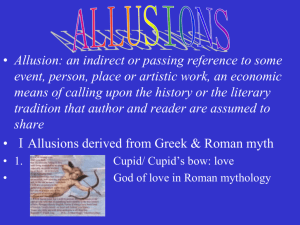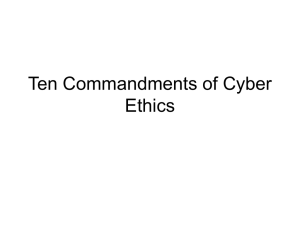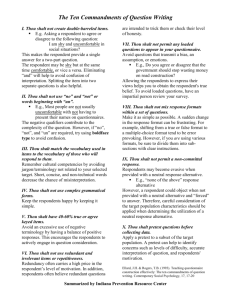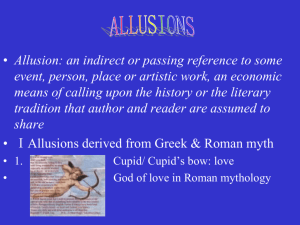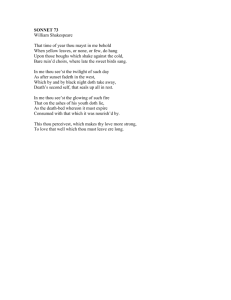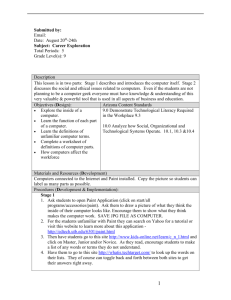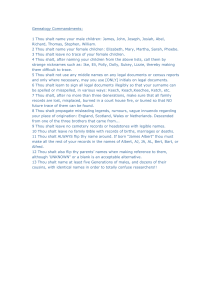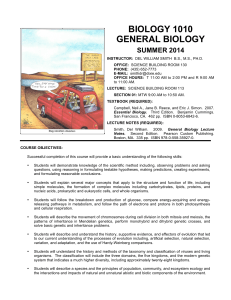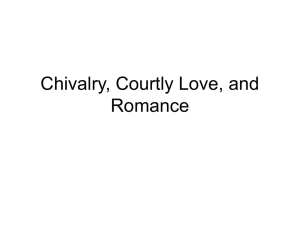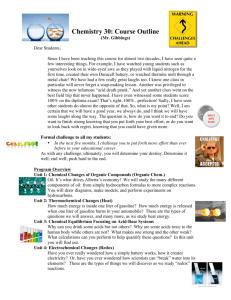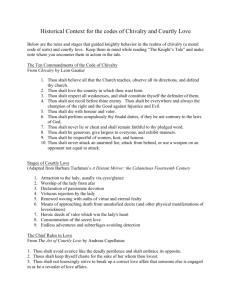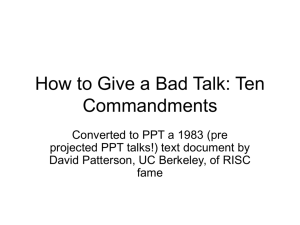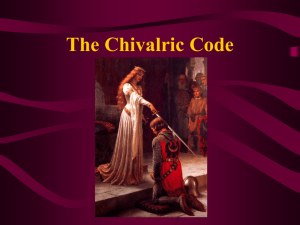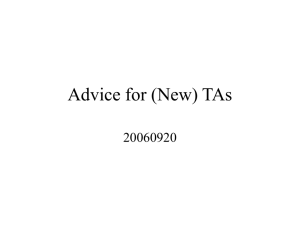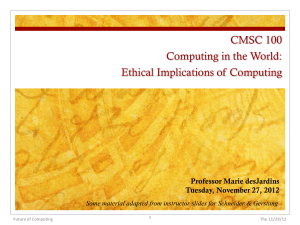10 Commandments for Writing Good Essays
advertisement
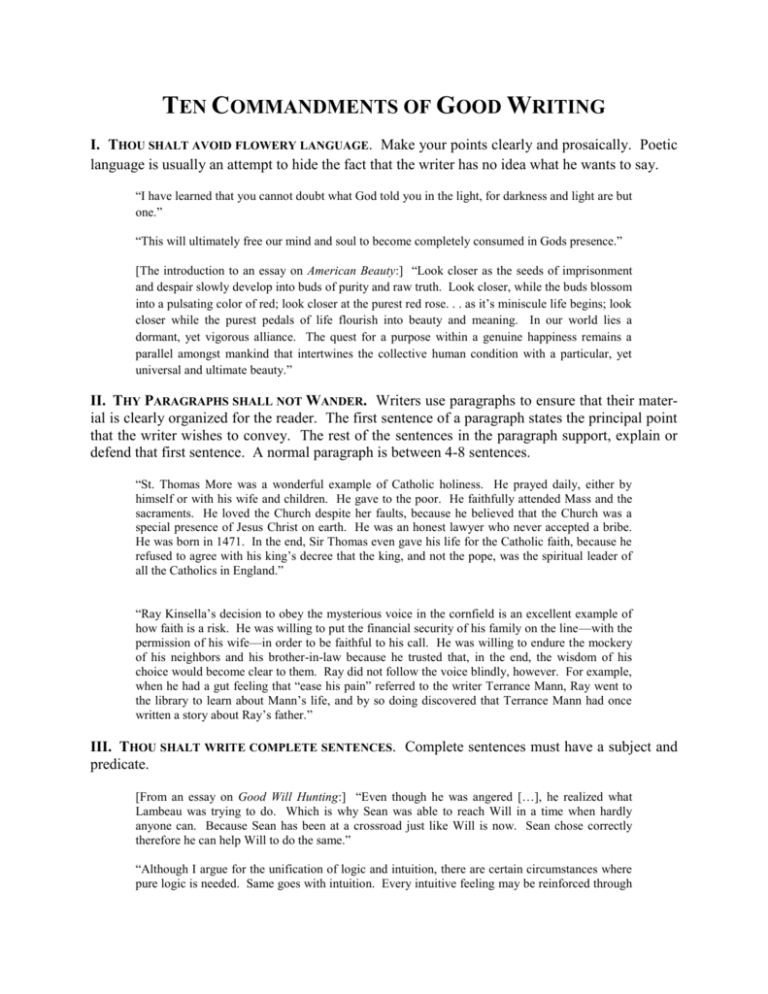
TEN COMMANDMENTS OF GOOD WRITING I. THOU SHALT AVOID FLOWERY LANGUAGE. Make your points clearly and prosaically. Poetic language is usually an attempt to hide the fact that the writer has no idea what he wants to say. “I have learned that you cannot doubt what God told you in the light, for darkness and light are but one.” “This will ultimately free our mind and soul to become completely consumed in Gods presence.” [The introduction to an essay on American Beauty:] “Look closer as the seeds of imprisonment and despair slowly develop into buds of purity and raw truth. Look closer, while the buds blossom into a pulsating color of red; look closer at the purest red rose. . . as it’s miniscule life begins; look closer while the purest pedals of life flourish into beauty and meaning. In our world lies a dormant, yet vigorous alliance. The quest for a purpose within a genuine happiness remains a parallel amongst mankind that intertwines the collective human condition with a particular, yet universal and ultimate beauty.” II. THY PARAGRAPHS SHALL NOT WANDER. Writers use paragraphs to ensure that their material is clearly organized for the reader. The first sentence of a paragraph states the principal point that the writer wishes to convey. The rest of the sentences in the paragraph support, explain or defend that first sentence. A normal paragraph is between 4-8 sentences. “St. Thomas More was a wonderful example of Catholic holiness. He prayed daily, either by himself or with his wife and children. He gave to the poor. He faithfully attended Mass and the sacraments. He loved the Church despite her faults, because he believed that the Church was a special presence of Jesus Christ on earth. He was an honest lawyer who never accepted a bribe. He was born in 1471. In the end, Sir Thomas even gave his life for the Catholic faith, because he refused to agree with his king’s decree that the king, and not the pope, was the spiritual leader of all the Catholics in England.” “Ray Kinsella’s decision to obey the mysterious voice in the cornfield is an excellent example of how faith is a risk. He was willing to put the financial security of his family on the line—with the permission of his wife—in order to be faithful to his call. He was willing to endure the mockery of his neighbors and his brother-in-law because he trusted that, in the end, the wisdom of his choice would become clear to them. Ray did not follow the voice blindly, however. For example, when he had a gut feeling that “ease his pain” referred to the writer Terrance Mann, Ray went to the library to learn about Mann’s life, and by so doing discovered that Terrance Mann had once written a story about Ray’s father.” III. THOU SHALT WRITE COMPLETE SENTENCES. Complete sentences must have a subject and predicate. [From an essay on Good Will Hunting:] “Even though he was angered […], he realized what Lambeau was trying to do. Which is why Sean was able to reach Will in a time when hardly anyone can. Because Sean has been at a crossroad just like Will is now. Sean chose correctly therefore he can help Will to do the same.” “Although I argue for the unification of logic and intuition, there are certain circumstances where pure logic is needed. Same goes with intuition. Every intuitive feeling may be reinforced through logic, but to continue with the feeling, even after using logic to confirm, we circle back to intuition. Therefore leaving intuition as a basis of most reasoning. Furthermore leaving God as a basis for each decision making process we use, which is why the call for discernment is necessary.” “Frodo through his journey has become more and more attached to the ring. Which is clearly a concrete symbol for evil.” IV. THOU SHALT USE SINGULAR AND PLURAL CONSISTENTLY. “Every person has been created to live their life in a way that they see fit.” “[Sean] then goes on to tell [Will] about the next eighteen years of his life dedicated to her even when she became really sick with cancer. From Will’s reaction, he is amazed that someone could share themselves like that to another and give up so much for her.” “By obeying this belief we shall free ourselves from each objects as though they were in our way of our final destination.” V. THOU SHALT AVOID “ABSOLUTE” STATEMENTS. Be extremely wary of words like “always,” “never,” “all,” “none,” “everywhere,” “nowhere,” etc. There are usually exceptions to universal statements, and so you lose credibility in the eyes of your readers. “The Lord of the Rings has always been seen as an allegory of Christ’s life and Christianity in general.” “The meaning of life is an individual journey and no one journey or standard is better than any other.” VI. THOU SHALT KNOW THE DIFFERENCE BETWEEN CONTRACTIONS AND POSSESSIVES. Do not confuse: 1) its and it’s, 2) their, they’re and there, 3) your and you’re, 4) boy’s and boys’, etc. “I think its okay to ask a lot of questions.” “Before church I and my family would meet at my grandparents house across the street.” “These concepts are exemplified by each characters struggle with relationships.” VII. THOU SHALT AVOID VAGUE STATEMENTS. Vague statements tell the reader nothing (which is handy when writers do not know what they wish to say), or are so general that they contradict themselves. Provide your reader with real or fictional examples, or at least use more specific terms to explain your point. “I enjoy excelling in pivotal points and anxiously wait concurring my next challenge. If something does not feel right, I will have a sense that it was not meant for me at that moment in time. Therefore, I move on to a better and more meaningful contribution to society.” “I think that the meaning of life is truly intertwined into life itself. I feel as though a man can never truly know the meaning of life for he is to ‘small’ in a sense. Not knowing the ‘meaning of life’ plays a vital role in helping us pursue and accomplish feats in our lives. Everybody as individuals have meaning in their lives.” “First, I believe that we live our life the way we chose, not the way we believe we’re supposed to live in order to achieve an ultimate goal after death.” “We must make the best of all the things that we come across. We are all different and each one of us has their own values, passions and talents. Whether this was by design or random, it is up to us make the decisions that are consistent with those values, beliefs and goals: to make the best of things.” VIII. THOU SHALT NOT WRITE “I” OR “YOU” IN ACADEMIC ESSAYS. For example, do not write “I believe that Clint Eastwood is a great director”. Instead simply write, “Clint Eastwood is a great director”. It is obvious that you believe it, since you wrote it. (One exception to this rule is when you’re writing a personal reflection paper.) “I chose J.R.R. Tolkien’s movie The Lord of the Rings: the Return of the King to analyze an allegory.” “I chose to write my paper on Good Will Hunting and The Exorcist because I was told that both films are classics and I had not seen either of them.” “I believe our soul is God and his way of guiding us along the path of his will. He knows every decision we will make before it even happens. Because he runs through our soul, we must use meditation or contemplation to connect. Either way is sufficient it merely depends on which process of prayer works best for you.” IX. THOU SHALT AVOID SLANG. Don’t write “John Paul II dissed the excesses of capitalism” or “Angelina Jolie rips Jennifer Aniston” or “This movie deals with discernment”. You embarrass yourself by showing that you have no intelligent grasp of the English language. Take one extra second and think of the right word. X. THOU SHALT PAY ATTENTION TO DETAILS. --Times New Roman font, 12 point type. Nothing else. --No cover page. --Justify the right side of paragraphs. Double-space. One-inch margins only. --Put two spaces after periods at the end of sentences, one space after commas. --Do not print on both sides of a page. --Do not put a page number on page 1. It should start with “2” on page 2. (There is a special command where you can do this.) --Submit essays with a paper-clip (preferably) or staple. No loose pages. --Identification should be single-spaced, in the upper left-hand corner: (student name) Fr. Barton Geger, SJ Jesuit Spirituality RS 370 19 February 2010
